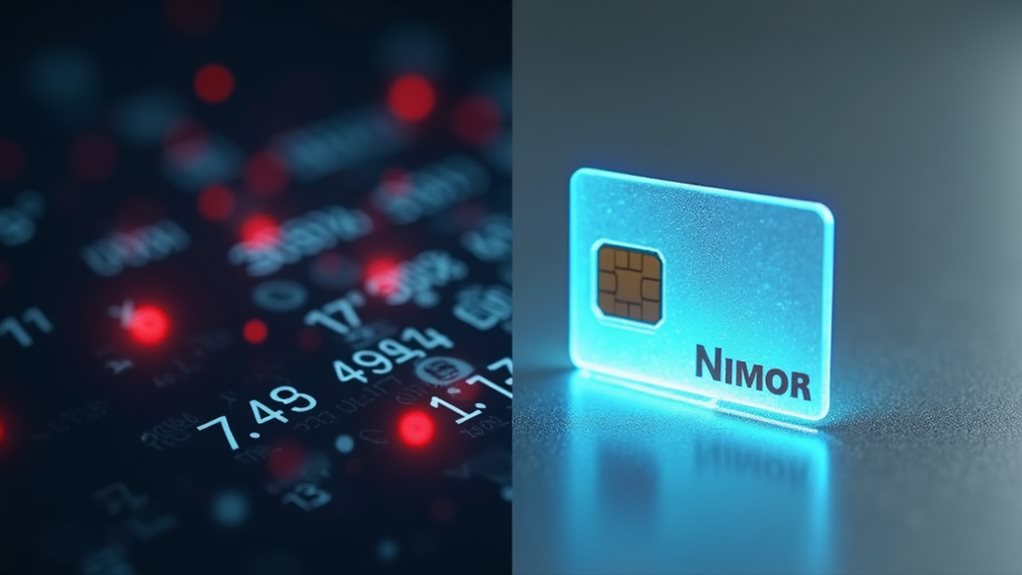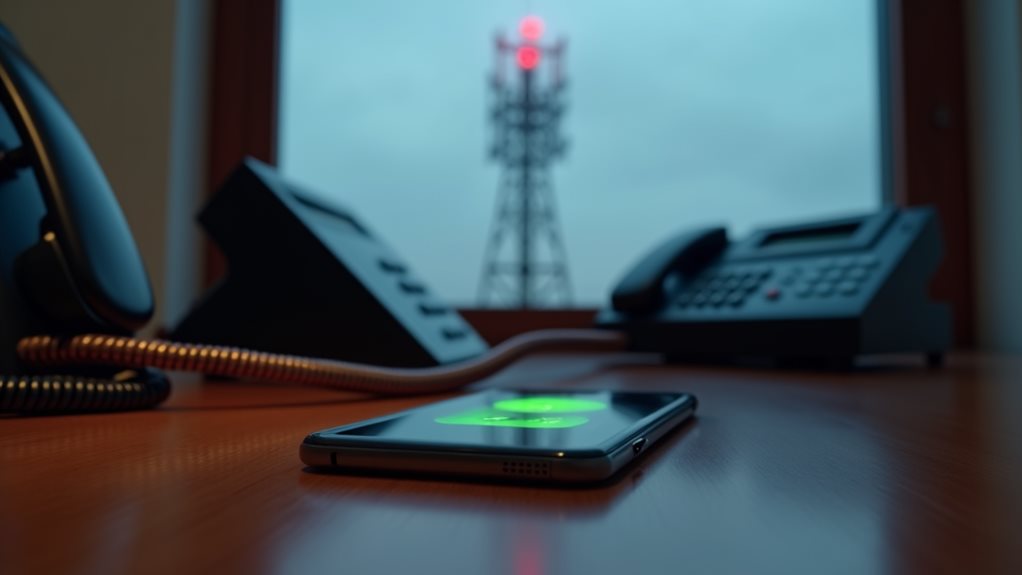A non-VoIP number is your traditional phone number that operates through established telephone networks rather than internet connectivity. You'll find these numbers tied to physical locations through SIM cards or landlines, utilizing copper wire networks for reliable analog signal transmission. Unlike VoIP services, non-VoIP numbers offer superior call quality, enhanced security features, and consistent performance even without internet access. They're essential for e-commerce, banking transactions, and two-factor authentication processes, as major platforms trust their verification capabilities. Non-VoIP numbers also excel in emergency situations and remote locations, making them a critical tool for both personal and business communications. Understanding their distinct advantages will help you make informed communication choices.
Understanding Non VoIP Numbers
Understanding non VoIP usage begins with recognizing its fundamental differences from internet-based calling. You'll find that these numbers are physically tied to specific geographic locations through SIM cards or landline connections, making them particularly valuable for emergency services and location-specific needs. These systems utilize copper wire networks for transmitting analog signals through central telephony offices. Established telecommunication carriers provide these numbers with verifiable user identities. Non-VoIP numbers offer reliable service quality that stands in contrast to the occasional disruptions experienced with VoIP calls. Unlike their internet-dependent counterparts, non-VoIP numbers aren't affected by connectivity limitations that often plague online services.
You're getting enhanced security features with non-VoIP numbers, as they're less vulnerable to cyber threats that commonly target internet-based communications. Whether you're running a business or handling personal calls, you'll appreciate the clear voice quality and dependable service these numbers provide. They're especially essential in remote areas where internet service might be spotty, ensuring you stay connected when it matters most.
Key Features and Benefits
The key features and benefits of non-VoIP numbers make them indispensable for both personal and business communications. You'll discover that these numbers offer stable connectivity without relying on the internet, ensuring your conversations remain uninterrupted regardless of your online status. Based on user experiences, the call quality remains consistently high thanks to traditional cellular networks. These numbers support various formats including landline and toll-free options to suit different communication needs. Traditional phone networks offer optimal reliability since they're less vulnerable to digital security threats compared to internet-based systems, making them an essential component for secure communication.
When it comes to personal preferences, you'll appreciate how non-VoIP numbers enhance your privacy while providing essential features like voicemail and call forwarding. You're also getting built-in emergency service access with accurate location tracking, which isn't always guaranteed with internet-based alternatives.
For businesses, you're securing a reliable communication channel that won't falter during internet outages, making it perfect for customer service operations. You'll find these numbers particularly valuable for account verification purposes, as many online platforms specifically require non-VoIP numbers.
Whether you're running a local business or managing remote operations, you're getting a communication solution that combines security, reliability, and versatility. Plus, you're able to maintain a strong local presence with geographic-specific area codes that build trust with your community.
Security Advantages

Building on these robust features, non-VoIP numbers excel remarkably in security aspects. When you're looking to strengthen your security protocols, these numbers provide enhanced protection against cyber threats and data breaches that commonly plague internet-based communications.
The physical tie to specific locations makes non-VoIP numbers inherently more secure. Major online platforms like Apple and Facebook rely on these numbers because SMS verification codes are essential for secure authentication. You'll find that non-VoIP numbers create a robust shield for your sensitive information, making it considerably harder for hackers to intercept your data. Additionally, they are recognized as reliable options for both individuals and businesses when it comes to safeguarding sensitive communications.
What makes non-VoIP numbers particularly valuable is their role in maintaining data integrity through thorough verification processes. You can count on them for reliable two-factor authentication, ensuring that your accounts remain secure from unauthorized access.
By utilizing non-VoIP numbers for account verification, you're adding an essential layer of protection that's become increasingly vital in today's digital landscape.
The security advantages extend beyond basic protection, as you'll benefit from enhanced privacy features that shield your personal information from potential threats.
When you're conducting business or handling sensitive communications, non-VoIP numbers act as a protective barrier, keeping your actual contact details private while ensuring seamless communication.
This combination of security and privacy makes non-VoIP numbers an invaluable tool in your digital security arsenal.
Differences From Voip
Between non-VoIP and VoIP numbers lie several fundamental differences that shape their functionality and use cases.
You'll find that traditional non-VoIP numbers are firmly anchored to physical locations and operate through established telephone networks, while VoIP numbers function through internet connectivity, offering greater flexibility in how you'll use them.
When considering cost comparison, you'll notice that non-VoIP numbers typically come with higher fees, especially for international calling, which affects user demographics as businesses and individuals seek cost-effective solutions. Non-fixed VoIP offers budget-friendly SaaS options that avoid high upfront costs.
However, you're getting different benefits with each option. Non-VoIP numbers offer superior emergency services integration and don't depend on internet connectivity, making them ideal if you're in areas with unreliable internet service. They're particularly valued by users who prioritize consistent, traditional telephone service. VoIP numbers convert voice signals into digital data packets for transmission over the internet.
Your non-VoIP number works through copper wire and cellular networks, requiring a physical SIM card or specific device assignment.
While you won't get the advanced digital features of VoIP services, you'll benefit from reliable standard features like voicemail and call forwarding, plus the assurance of traditional telecom operator support and regulatory compliance.
Best Uses and Applications

Security and reliability drive the most compelling applications for non-VoIP numbers. You'll find these numbers particularly valuable in practical scenarios where traditional phone service proves essential, from secure account verification to professional business communications. Traditional telecommunication providers ensure these numbers maintain superior call quality throughout your conversations. Many e-commerce and banking sites specifically require non-VoIP numbers for transactions.
In user experiences across various sectors, non-VoIP numbers demonstrate their versatility. You can use them to protect your privacy when signing up for online services, ensuring your personal number stays private. Additionally, these numbers are often associated with enhanced security features that further safeguard your communications.
For business purposes, you'll appreciate their reliability in customer communication and account management, especially when you're handling multiple platforms that require phone verification.
If you're involved in temporary projects or traveling, you'll find non-VoIP numbers incredibly useful. They work consistently without internet connectivity, making them perfect for remote work situations or emergency communications.
You can count on these numbers for their enhanced security features, protecting you against fraud while maintaining professional credibility. Whether you're managing a business helpdesk or need a reliable number for personal use, non-VoIP numbers offer the stability and security you're looking for in today's interconnected world.
Frequently Asked Questions
Can I Convert My Existing Voip Number to a Non-Voip Number?
You'll find VoIP options are limited for converting to non-VoIP. While number portability exists, you'll typically need to switch providers and get a new number from a traditional telecom operator instead.
How Long Does It Typically Take to Activate a Non-Voip Number?
You'll typically see your non-VoIP number activated within a few hours to 2 business days. If you're doing number portability from an existing line, the activation time may extend up to 5-7 business days.
Are International Calls More Expensive With Non-Voip Numbers?
Yes, you'll find international calling rates are higher with non-VoIP numbers compared to VoIP services. While non-VoIP advantages include reliability and security, you'll typically pay more for international calls through traditional phone networks.
Can Multiple Devices Share the Same Non-Voip Number Simultaneously?
No, you can't share a non-VoIP number simultaneously across multiple devices naturally. While there are some workarounds for shared access, device compatibility is limited since these numbers are tied to specific physical devices or SIM cards.
What Happens to My Non-Voip Number if I Move to Another Country?
You'll likely need to change your number when moving internationally, as non-VoIP numbers are tied to specific locations. International number portability is limited, and local regulations often prevent keeping your original number across borders.
Final Thoughts
You'll find that non-VoIP numbers offer essential advantages in today's digital landscape, particularly when you need reliable verification and enhanced security. Whether you're managing business communications or protecting personal accounts, these traditional phone numbers provide stability and trustworthiness that VoIP alternatives can't match. Consider investing in a non-VoIP number if you're serious about maintaining secure, dependable telecommunications while meeting stringent verification requirements.

